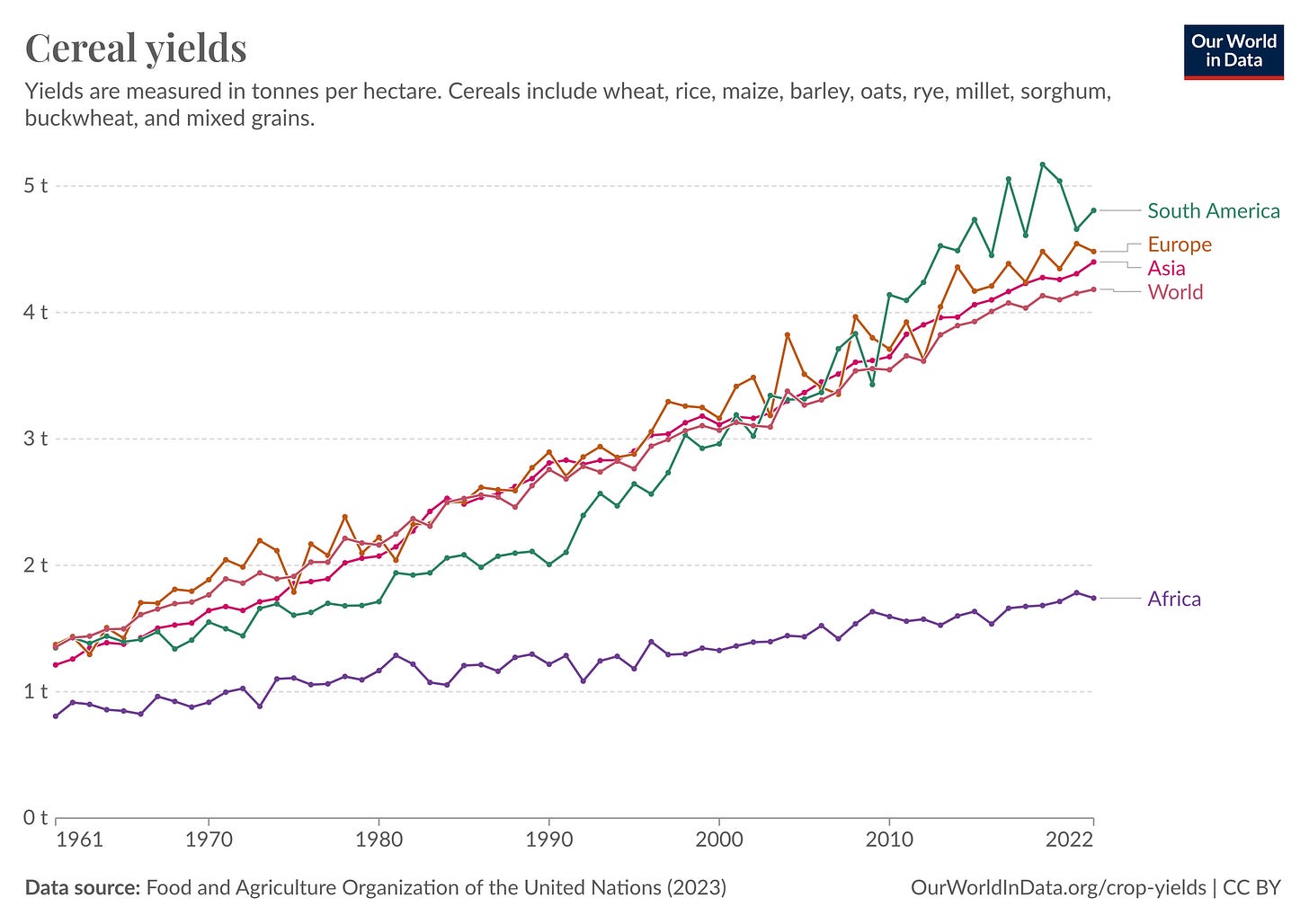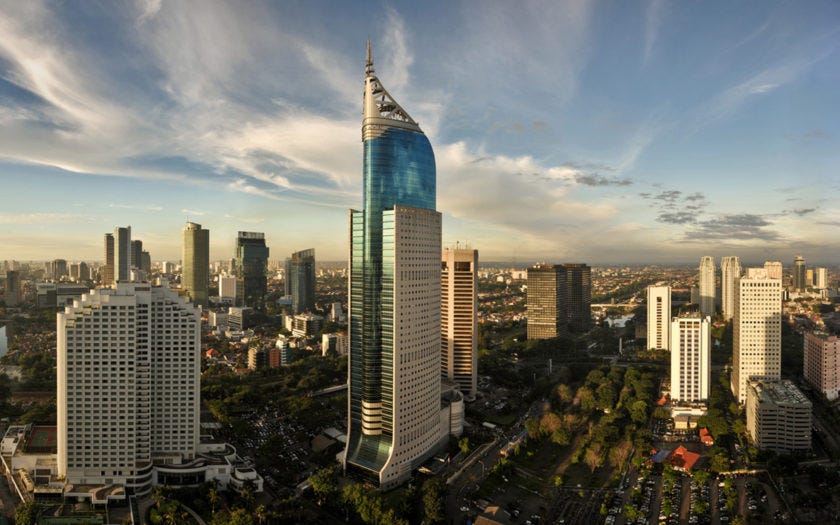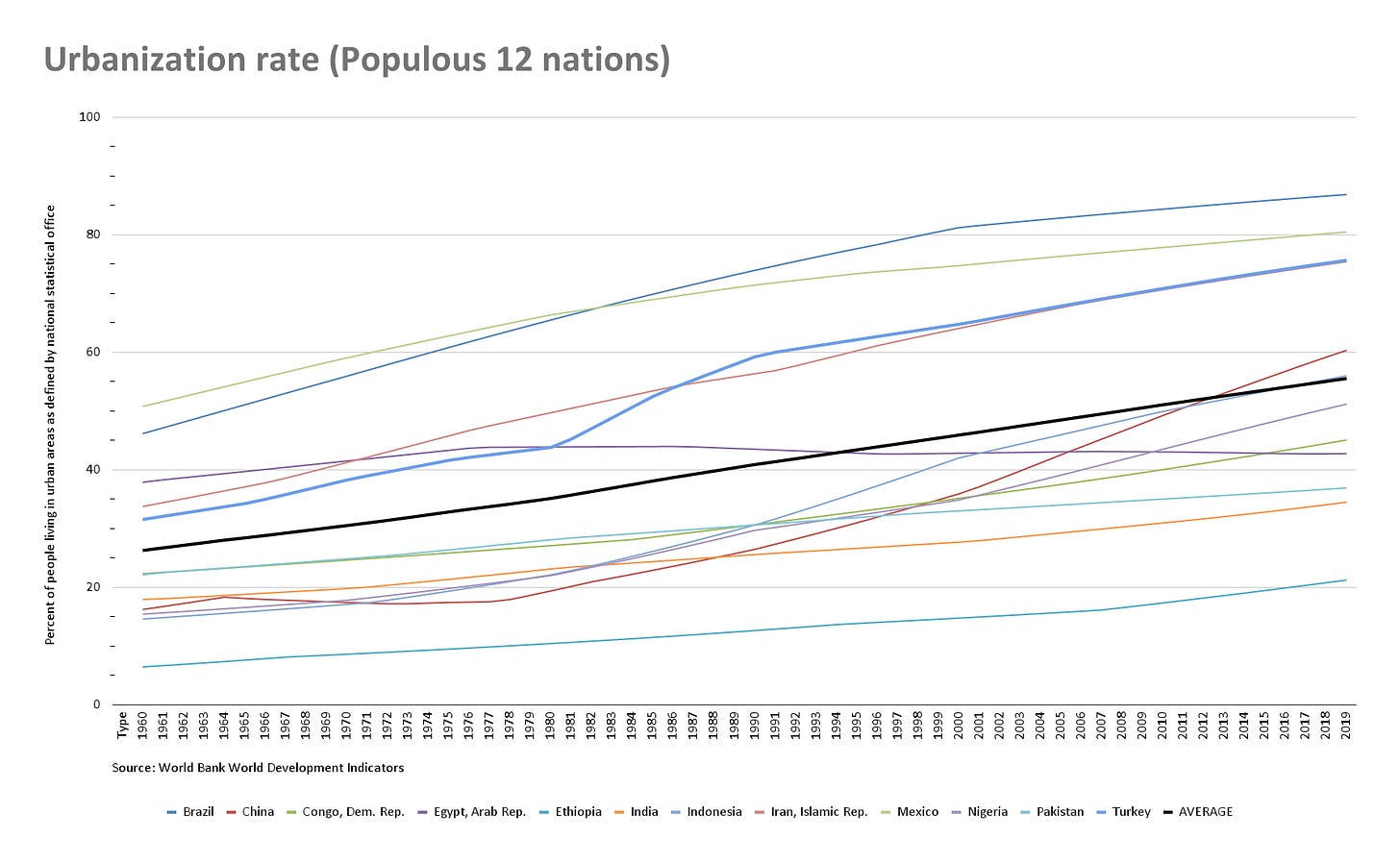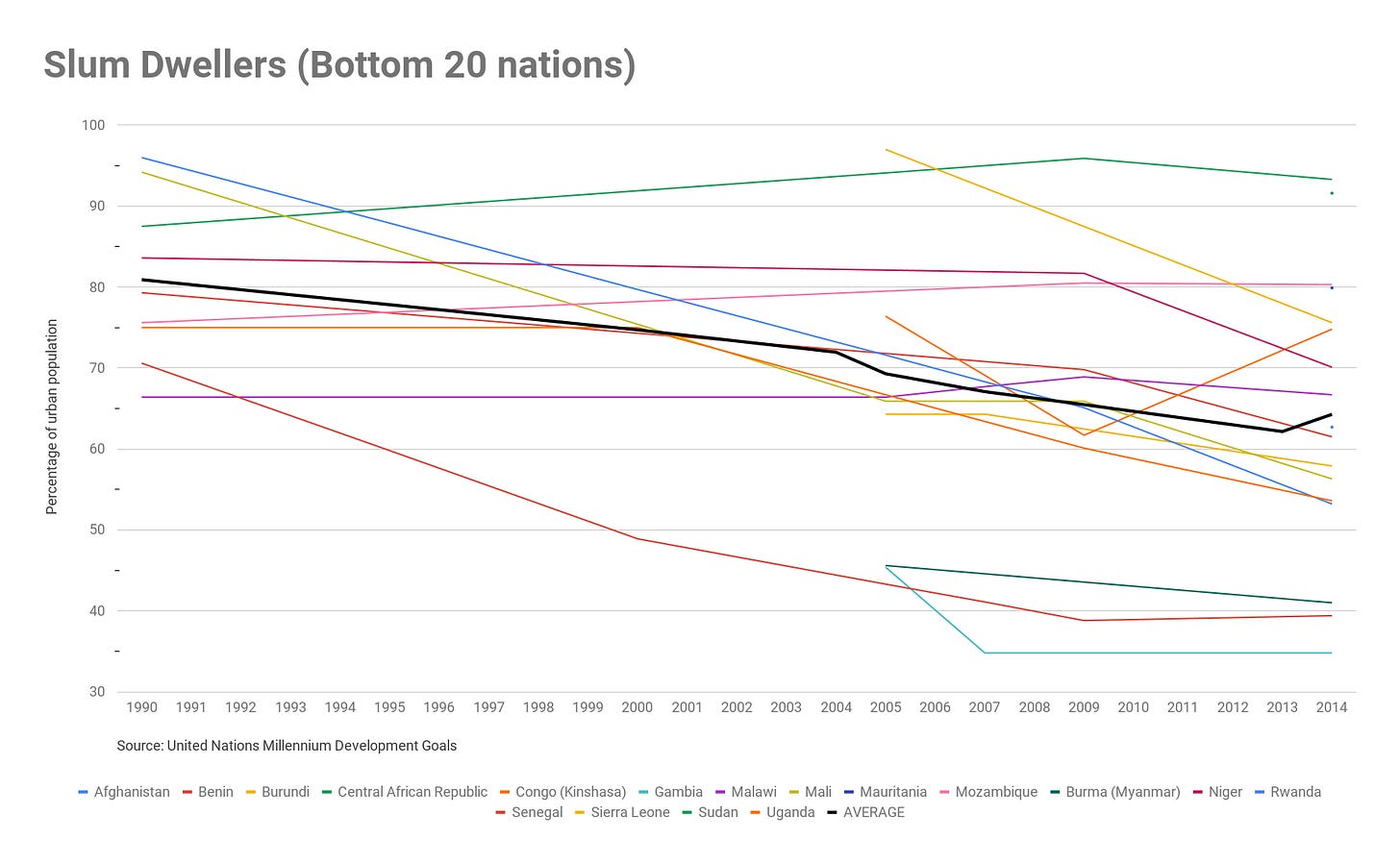What ingredients are developing nations missing?
And what reforms get the most "bang for the buck?" in triggering economic growth
Most of the following is an excerpt from my second book Promoting Progress: A Radical New Agenda to Create Abundance for All. You can order my e-books at a discounted price at my website, or you can purchase full-price ebooks, paperback, or hardcovers on Amazon.
Other books in my “From Poverty to Progress” book series:
You can read other articles on developing nations, including:
Why developing nations are still poor:
What wealthy nations can do to help developing nations:
What developing nations can do to help themselves:
What ingredients are developing nations missing? (this article)
How developing nations can create competitive export industries
Why Developing nations need to create thriving export industries
Assessing the Five Keys
In previous articles, I assessed the quality of the advice given by Western development experts. It is pretty clear their advice is largely based on theory and ideology, not what has actually worked in the past.
So we are left with none of the four schools giving very useful advice. It should not be surprising that developing nations are getting increasingly skeptical of Western advice and finding their own path.
So should we just give up and insist that nothing works?
No, and if you doubt me, take a look at my first book, From Poverty to Progress. Despite poor advice from Western experts, progress is happening all over the globe. Better yet, that progress is particularly strong in the poorest nations.
So if we take the advice of most experts, nothing works in theory, but a great deal of it works in practice!
We must do better. We must focus on the Five Keys to Progress.
Below I assess the current state of developing nations to see how they measure up against the Five Keys to Progress. Both wealthy nations and developing nations need to keep their focus on their relative levels of the Five Keys to Progress. Think of the Five Keys as a scorecard that enables nations to see what is most important to focus on while in their current state.
As conditions change, the scorecard changes. As the scorecard changes, the necessary strategy and policies change as well. But the focus should always be on the Five Keys to Progress.
It is important to keep in mind, however, that there are vast differences between developing nations. Some export massive amounts of petroleum and natural gas, while others export none. Some have very large populations, while some are tiny islands with few inhabitants. Some border wealthy nations, while others are far away and have no ocean ports. Some have tropical climates, while a few have temperate climates.
Some have a history of European colonialism, while others were never conquered. Some have a recent history of Communism, while most do not. Some are democracies, while others are authoritarian or totalitarian regimes. Developing nations also diverge greatly by language, religion, ethnicity, and history.
Most importantly, developing nations diverge greatly by current levels of per capita GDP (PPP). Some nations, such as Taiwan and South Korea, are as rich as many European nations and have highly diverse export-based economies. Other nations such as Brazil, China, India, Indonesia, Mexico and Turkey are much poorer but have experienced significant economic growth over the last 30 years. Then there are nations such as Afghanistan, Liberia, Congo and Haiti who are still living in serious poverty (although, as I show in my book, From Poverty to Progress, the 20 poorest nations in 1990 have improved faster than the rest of the world).
As a reminder, the Five Keys to Progress are:
Decentralized political, economic, religious, and ideological power.
At least one high-value-added industry that exports to the rest of the world.
Key #1: Productive Agriculture
The first key (agriculture) is largely a solved problem. By that, I mean that:
we know what works, and
the vast majority of developing nations are moving in the right direction.
The main exception is Sub-Saharan Africa, which has far less productive agricultural systems than other developing nations.
Agriculture is far more productive than it was two centuries ago, and it is likely to keep getting more productive. We also have a global distribution system that moves the food surplus from the most important grain producers (USA, Australia, Canada, France, Argentina, Russia, and Ukraine) to poor nations. Famine has been virtually eliminated and undernourishment is also rapidly declining.
I have already outlined the benefits of a Second Green Revolution in Sub-Saharan Africa and the dangers of opposition to modern agricultural technologies. This is probably more of a problem with the politics in wealthy nations than anything that developing nations can deal with themselves. So, unless a nation has a particularly unproductive agricultural system (for example Sub-Saharan Africa), it is probably wise to focus efforts elsewhere.
Just don’t completely ignore farmers; they are a foundation of progress.
Key #2: Cities
The second key (cities) is also already a solved problem. More than half of humanity now lives in cities, and virtually every developing nation has either high rates of urbanization or rates that are rapidly increasing. It is difficult to see how this can be reversed. As I showed in my first book, the massive slums that haunted our imagination in the late 20th Century are disappearing rapidly (see graphic below).
Of course, governments can do more in this area. They need to ensure that housing stays affordable by not restricting home construction, particularly on the outskirts of metro areas. This is largely a matter of not following Western practices of using land regulation to force density. Affordability is far more important than density.
Governments can also make cities more livable and functional by building a foundation upon which the vast decentralized problem-solving network of people living in cities can solve problems.
Governments should ensure that energy, transportation, and communication for their cities’ infrastructures get constructed and well maintained. This might be by direct government services or by the government giving private companies incentives to do so.
In addition, low-cost investment in education to promote literacy, numeracy, and advanced technical knowledge, such as engineering, can increase the level and diversity of skills in cities. Finally, basic investments in vaccinations, sanitation, water filtration, and public health can have a significant positive impact on the quality of life in urban areas.
All of this makes sense to most people and to a large extent, it is already happening. Governments in developing nations are doing so by copying the infrastructure, institutions, and policies that are already working in wealthy nations.
So all of this is a solved problem in the sense that we know what works, and developing nations are moving in the right direction. Sure, they can do more, but I doubt that doing so will be the most effective use of scarce revenues.
And most importantly, where does the money to pay for all of this investment come from? Most developing nations are already realistically doing all they can in this area.
In this domain, I agree with William Easterly. Foreign aid has a very bad track record of accomplishing these tasks. Authoritarian leaders and corrupt officials use the money for their self-interest, so much of that money only reinforces the problem. And wealthy nations do not have infinite resources of goodwill to spend the trillions of dollars necessary to make it happen.
Developing nations must find a solution that is not dependent upon generous foreign aid or large increases in government revenue. More on this later…
Highly cost-effective investments, such as those that I mentioned above seem reasonable, but they do not get to the heart of the problem.
Key #3: Decentralization of Power
The third key (decentralized political, economic, religious, and ideological power) is a difficult problem to solve. From the fall of the Soviet Union to about 2005, non-Western nations across the world made an incredible shift to democracy and freedom.
But then, around 2005, progress in this domain slowed down and even reversed somewhat. Fortunately, this reversal did not slow down economic growth.
In this area again, I agree with William Easterly. Convincing political and economic elites that they should undermine their own power is not realistic. Just like monarchies in 18th Century Europe, many of those elites fear progress because of what it might do to their power base. They do not want to create economic wealth in people who might use that wealth to threaten their political power. But like elected politicians in rich nations, they know that promoting long-term economic growth is critical to maintaining the legitimacy of their regime.
Like the 19th Century monarchies of Germany, Austria-Hungary, Italy, Russia, and Japan, modern-day dictators are desperately trying to get the benefits of progress without that same progress undermining their regime. As the post-World War I collapse of those empires shows, this is a difficult balancing act that can lead to very bad results.
Fortunately, there is no evidence that nations need democracy, free markets or good institutions in order to start progress. Very few nations have been democratic before they transitioned to a state of progress. And many authoritarian regimes in Europe and East Asia have been able to initiate economic growth before it inevitably undermined their power and their nation transitioned to democracy.
I believe strongly in democracy and political rights. I think that they have worked in so many different cultures that they can function in any nation. Polls clearly show that the vast majority of people on Planet Earth want them (Pew).
But I am not sure that promoting democracy and political rights in developing nations will by itself lead to long-term economic growth. Except for a few hardline totalitarian nations, such as North Korea, there is already enough non-violent competition between institutions to get the ball of progress rolling if all the other conditions apply. The other conditions are the remaining Keys to Progress.
Proposals That Might Actually Work
Unlike the other four schools that we already discussed, I am hesitant to offer advice to developing nations. They have rightly grown skeptical of such advice and have largely followed their own path.
In addition, there are enormous variations between them. It is difficult to offer useful advice to China, Congo, Argentina, Honduras, Bhutan, Moldova, Iraq, and Palestine because they all live in very different circumstances. To cover so many different nations with so many different circumstances, one has to keep the advice very general, and this interferes with the advice being actionable. It is hard to find the right balance, but here goes.
My advice to leaders in developing nations would be:
Do not try to do everything. You have few resources, so you must focus on what matters most. With proper prioritization and solving the most important problems first, you can unlock solutions to all the other problems.
Do not follow the advice of current Western experts. Their advice is based on theory and ideology, not what has worked in the past.
Stay positive. Despite the bad advice coming from Western experts, many other developing nations have improved the lives of their citizens greatly over the last few decades.
Look to the actual history of how societies transformed from poverty to progress, not theory or ideology.
Focus intensely on the Five Keys to Progress.
In particular, look at the fourth key: a society must have at least one high-value-added export industries.
And do not listen to Greens who are trying to undermine the fifth key: widespread usage of fossil fuels.
All Five Keys to Progress matter, but I believe that the fourth (export industries) and fifth keys (fossil fuels) are the most relevant to developing nations today. I will go into much more detail on each in subsequent articles.
Most of the above is an excerpt from my second book Promoting Progress: A Radical New Agenda to Create Abundance for All. You can order my e-books at a discounted price at my website, or you can purchase full-price ebooks, paperback, or hardcovers on Amazon.
Other books in my “From Poverty to Progress” book series:
You can read other articles on developing nations, including:
Why developing nations are still poor:
What wealthy nations can do to help developing nations:
What developing nations can do to help themselves:
What ingredients are developing nations missing? (this article)
How developing nations can create competitive export industries
Why Developing nations need to create thriving export industries


















I don't think green activists (who are not particularly influential in their nations) are responsible for the low agricultural productivity in Africa. Additionally you think the "Western economic advice" is bad you should see the policies African countries normally pursue. Before the 80s, the world bank didn't give economic advice to countries but the massive defaults and currency crisises made the bank much more cautious about lending to developing countries.
You're basically promoting the same propaganda that African leaders parrot. They consistently fuck up the basics and then blame western economists and activists for their own failure. Unless Africans learn to stand on their own two feet they will never get anywhere.
I know this is very hard for you understand as an American, but you are not the centre of the world. You are not responsible for either Africa's success or failure.
Glad to finally get to your recommendation on this series. The key is high value exports.